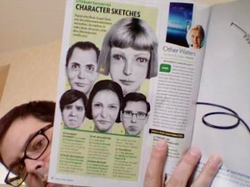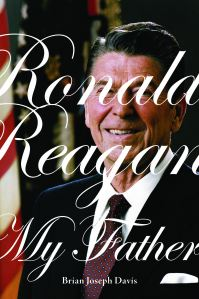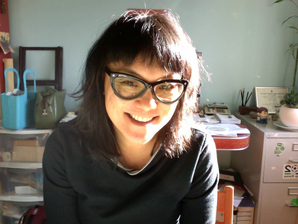 Brian Joseph Davis Brian Joseph Davis the author of Portable Altamont, a collection that garnered praise from Spin Magazine for its “elegant, wise-ass rush of truth, hiding riotous social commentary in slanderous jokes.” Slate called his novel I, Tania, “The book of your fever dreams.” A co-founder of the literary website Joyland, his short stories have been collected recently in Ronald Reagan, My Father and included in Against Expression: An anthology of conceptual writing (Northwestern University Press). His music and art productions have been acclaimed by Wired, Pitchfork, Salon, and LA Weekly, which wrote, “Davis has an amazing head for aural experiments that are smart on paper and fascinating in execution.” He’s written for Utne, The Globe and Mail and The Believer (forthcoming). He lives in Brooklyn and rural Ontario with his wife, Emily Schultz. Kathryn Mockler: What is your first memory of being creative (writing, art making, etc.)? Brian Joseph Davis: I saw a documentary on special effects when I was 7 and attempted to make my Kermit the Frog doll "animatronic" with old bike parts. Without the stuffing, and full of bike brakes, I thought he he looked deflated so I filled it toothpaste. That looked messy so I then attempted to "set things" by putting it in the freezer. I forgot about it there until my mom found a gutted Kermit the Frog doll full of gears and toothpaste. KM: How would you describe conceptual writing to someone unfamiliar with the genre? BJD: It's an umbrella term, but I'd say it's any writing with a formal concern--writing that starts from a certain point or a set of rules, almost like a game. That could include anything from Beckett to a Saturday Night Live parody. KM: How did you first get interested and involved with conceptual writing? BJD: I was creating this kind of work coming out of media art, with my inspirations being all over the map: JG Ballard, Kathy Acker, artists who work with text like Fiona Banner, Jenny Holzer. Little did I know that people like Darren Wershler or Ken Goldmsith on the East Coast, or Vanessa Place on the West Coast, were codifying conceptual writing. Their hard work has made it easier. KM: How would you describe your art/writing practice/process? BJD: When I do this kind of work I'm really looking for a kind of database of text. A good chunk of information that hasn't been exploited beyond its original use yet. KM: What artists/writers/poets would you recommended to someone aspiring to be an experimental or conceptual writer? BJD: I kind of hesitate to suggest a canon because this genre is a genre of practitioners. Like cheese making you only learn by doing so I'd suggest, find an idea and do it. Start with queso fresco. KM: What is your funniest literary moment? BJD: I was presenting "Johnny" in LA a couple of years ago, and afterwards a woman came up to me and said, I think you used lines from a script I wrote. KM: Your recent Tumblr project The Composites in which you create images "using law enforcement composite sketch software and descriptions of literary characters" is getting a lot of media attention. Why do you think that is? BJD: In North America, technology and culture have been in a 10-year sprint to forensicize everyday life far beyond the need of basic law enforcement. Internationally, of course, that has been the case much longer with Europe especially having to negotiate surveillance culture for decades. I’d also say that the combination of a law enforcement media and literature is a snapshot of inner space right at a time when literature is experiencing an ontological crisis. Writing’s struggle with digitization emulsifies well, it seems, with technology’s struggle with issues of privacy and security. KM: What are you working on now? BJD: Thank god, nothing.
 BRIAN JOSEPH DAVIS' MOST RECENT BOOK Ronald Regan, My Father, ECW Press/Independent Publishers Group, 2010 Description from ECW “An elegant, wise-ass rush of truth, hiding riotous social commentary in slanderous jokes…It almost feels like he’s leading a palace coup.” – Spin Magazine on Portable Altamont “Davis’ brilliant media deconstructions are pointed and hilarious at the same time.” – Kenneth Goldsmith “The book of your fever dreams.” – Slate on I, Tania The elderly take to the streets at night for illegal and cathartic electric scooter racing. (Think Two-Lane Blacktop but starring Abe Vigoda and Estelle Getty.) A copy editor suffers brain damage from West Nile virus and is suddenly filled with cannibalistic violence and award-winning minimalist poetry. (It’s a little like Awakenings, but directed by David Cronenberg.) Mayor McCheese visits a sexually repressed British couple in the early 1970s and touches their lives forever. (Okay, try this: Pasolini’s Teorema but with Mayor McCheese.) A Texas doctor transplants the mind of a meth-addicted convict into the body of a suburban web developer, resulting in America’s first “death-penalty case that turned into a custody case that turned into a right-to-die case.” (It’s like a hole drilled in your head and five HBO original movies poured in all at once.) Startlingly original but anchored by vivid characters, Ronald Reagan, My Father weaves all these ideas, and more, into a bleakly hilarious vision that’s both human and uncanny – as if Raymond Carver was marooned on Mars with ten hours to live.  Mina Shum Multiple-award winning filmmaker Mina Shum has written and directed three feature films. Born in Hong Kong and raised in Vancouver, Canada, The New York Times calls Shum's work "wry and winning". As a director resident at the Canadian Film Centre, Shum developed her first feature-length film Double Happiness, which premiered at the 1994 Toronto International Film Festival, receiving the Special Jury Citation for Best Canadian Feature Film and tying in third place with Kieslowski for the Toronto Metro Media Prize. Double Happinessgarnered Canada’s highest film honours, winning Genie Awards for Best Actress (Sandra Oh) and Best Editing (Alison Grace) with additional nominations for Best Picture, Best Direction, Best Screenplay and Best Cinematography. It also won 1995 Berlin Film Festival prize for Best First Feature, as well the Audience Award at the Torino Film Festival in 1994. After it’s US premiere at Sundance, it was released theatrically in the U.S. by Fine Line Features in 1995. Her second feature Drive, She Said premiered at the Toronto Film Festival in 1997. The film was invited to the competition section of the Turin Delle Donne Film Festival in 1998. Shum’s third feature film,Long Life, Happiness and Prosperity premiered at the 2002 Toronto Film Festival and played to sold out audiences at the 2003 Sundance Film Festival. It won a Special Citation for Best Screenplay at the Vancouver Film Festival. It will be released theatrically in Canada by Odeon Films and in the U.S. by Film Movement. Shum has written and directed several short films, including Picture Perfect, which was nominated for Best Short Drama at the 1989 Yorkton Film Festival, Shortchanged, Love In, Hunger, Thirsty and Me, Momand Mona which won Special Jury Citation for Best Canadian Short at the 1993 Toronto Film Festival. Her 2011 web short, Hip Hop Mom has garnered thousands of hits and can be viewed for free at www.minashum.com. Shum directed the television movie, Mob Princess for Brightlight Pictures/W Network. Her episodic directing work includes: About A Girl, Noah’s Arc, Exes and Oh’s, Bliss, TheShield Stories and Da Vinci’s Inquest for which she was nominated for a Director’s Guild Award. Her episodic work has been seen on CTV, Global, Nickelodeon, CBC, N, Logo/MTV, Showcase and Lifetime. She is currently writing and developing her next feature film, Two of Me, with Brightlight Pictures, as well as writing and developing other feature projects including, The Lotus (co-written with Dennis Foon). RUSTY TALK WITH MINA SHUM Kathryn Mockler: How did you first get into filmmaking? Mina Shum: When I was 7, I got down on one knee, spread my arms wide like Al Jolson and declared "I want to be in show business." At 12, I started my first journal and wrote everything I thought, felt, and heard down. I would copy things I'd overheard on the bus ride home, word for word to examine the patter of speech and the subtext of a banal conversation between two ladies about a cupcake recipe. In grade 9, I was failing my knitting class and transferred to Drama and that was the beginning of my official training as a filmmaker. I went to theatre school at UBC, got a film diploma after my BA, and continue to study and practice the craft. KM: Where do you get your ideas from or what or who inspires you? MS: I am a voracious consumer of ideas, movies, art, theatre, music, dance, fiction and non-fiction. I read interviews with people I've never heard of. And I listen to both friends and strangers speak. I live entirely, throw myself into situations, get my heart broken, soar with infatuations. And somehow all that gets funneled through my guiding intention, which is to reflect and reveal how we can be happier. How to live more authentically, how to make the most out of this one life. So, how does this hodge-podge of thoughts gets distilled through my next feature? Two of Me is an irreverent romantic comedy about an overworked 35 year old super woman (two kids, live-in-mother-in-law, husband, high pressure job, trying to get promotion) and she's granted a wish for "two of me" except the other "me" is ten years younger when she was a no-good indie rock musician. It's a film about who you once were and who you've become and the disconnect that often occurs when we're busy living life! At its heart, it's about surppressing our true nature (which I think all my films are about). KM: What is the writing process like for you? MS: I get hooked on an idea, a question and I write.It starts in the title which I believe should say what's the essential theme/idea behind the movie; it starts with a good title. Then I write the three-sentence pitch. If I can do that, I move on to a proposal that is half director's vision and writer's beats. But after that I work on my treatment, which is beating out the film pretty well. And at this point it's the writer's hat I'm wearing. The writer has to deliver on the promise to the director. Being both writer/director, I have to know when to wear which hat. The director in me is a heavy taskmaster and will continue to make me (the writer) work the script until it sings and I take it over as a director. And then when I direct the film, I will continue rewriting bits even in the sound mix of the film. KM: How do you approach revision? MS: I rewrite until you are watching the movie in a theatre. When I say that, I mean in marketing, in my interviews and in my q and a. I assume that all the notes I get, is just gonna make the film better. I do reject notes. But if the same note is coming over and over, I take notice. KM: Writers/filmmakers often have to face a great deal of rejection, especially when they first start out. Do you have any advice for aspiring filmmakers on coping with this? MS: Nothing is ever lost when you practice. I like to think of all of life as a practice. Malcom Gladwell says it takes 10,000 hours to get really good at something. Clock your 10,000 hours. Keep working on it. I write and direct everyday even if it's just in my mind, toying with concepts or even a note to a friend. Trust the path. KM: What is the best thing about being a filmmaker and/or writer and the worst thing? MS: Best thing about being a filmmaker, making a film. Worst thing: waiting for the funding to make a film. But even as I write that, I know that I have to "practice" making that part fun, part of the process. At best it takes fours years to go from thought to you seeing it on the big screen. That's four years of living, breathing and waiting. Or should I say "practicing"?  From the short film HIP HOP MOM Photo by Matt Lyons A SHORT FILM BY MINA SHUM Check out Mina Shum's latest 4-minute short Hip Hop Mom. Synopsis When two alpha moms fight over a parking spot, they reveal their secret identities, and it's a hip hop battle royale! |
Rusty Talk
Rusty Talk Editor: Archives
November 2017
Categories
All
|


 RSS Feed
RSS Feed
